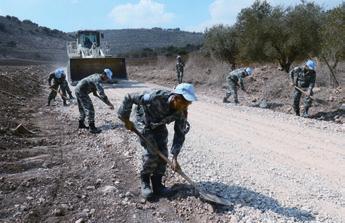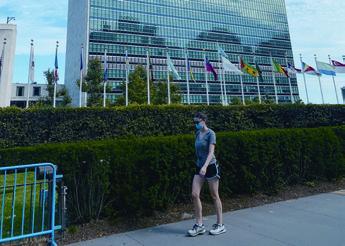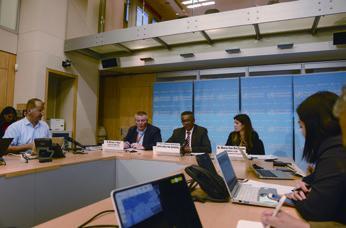The United Nations’Role
2020-09-23ByNiuZhongjun
By Niu Zhongjun
In October 1945, after the world achieved victory in the Anti-Fascist War, to avoid another such disaster, the major countries proposed to establish the UN. Over the following decades, the organization has played an irreplaceable role in maintaining peace, promoting development, protecting human rights and boosting international exchange. It has also safeguarded justice and enhanced understanding among different countries. Broadly speaking, it has fulfi lled the founding mission of being the coordination center of member countries.
Mandate fulfilled
Compared with the League of Nations, the fi rst worldwide intergovernmental organization that was founded in 1920 and dissolved in 1946, the UN is far bigger, now with 193 members. It is composed of six major institutions, including the General Assembly and the Security Council, and dozens of funds and special organizations, with over 100,000 staff working for it.

The past 75 years with the UN has been a relatively peaceful period, witnessing rapid economic growth and strengthened cooperation in most countries. Worldwide war has been avoided, regional conflicts mitigated and peace safeguarded with the UNs efforts. It has creatively developed peacekeeping operations. Since 1948, when the UN Truce Supervision Organization was founded, hundreds of thousands of peacekeepers from more than 120 countries have participated in over 70 missions. Blue helmets have increasingly become a symbol of the UN and peace.
The UN has promoted education and the rights of women and children as well as poverty eradication. The UN Millennium Development Goals halved the number of the world population living in extreme poverty from 1990 to 2015. In 2015, a grander agenda, the 2030 Agenda for Sustainable Development, was initiated. With some of its 17 goals already having made some progress, it is set to further promote sustainable development.
The UN adopted the Paris Agreement in December 2015, bringing major countries into a common cause to tackle climate change and respond to ensuing challenges. Looking through the UNs efforts, it could be said that it is leading the world to a better future; a world without it might be poorer and more unequal and turbulent.
New challenges
But despite the contributions and efforts, in todays world full of uncertainty and turbulence, the UN is being increasingly questioned. With the expansion of human activity and new technology, it not only faces traditional threats such as regional confl icts, displacement and extreme nationalism, but also new challenges, including mass extinction of species, population explosion and aging. In addition, it is also troubled by diffi -cult reform and arrears in member countriescontributions.
All such issues together with the outbreak of the novel coronavirus disease(COVID-19) pandemic has seen the anti-UN sentiment peak this year as most members are suffering from rising unemployment and a crippled economy. Some countries have tried to stigmatize others for the pandemic instead of taking effective containment measures. Such moves eroded international cooperation and solidarity, posing unprecedented challenges to the UN.
By alienating the UN, these countries are forgetting why our predecessors established this organization. Seventy-five years ago, the UN carried peoples goodwill to prevent war and confl ict, promote economic growth and human rights and enhance international equality. Today, countries are more interdependent and intertwined and the challenges we face, such as epidemics, climate change and Internet crimes, cannot be addressed by a single country alone, even if it is the most powerful one. Only through cooperation in the framework of multilateral mechanisms such as the UN can we respond to such issues and create a better world.
China and the UN
China was the first country to sign the UN Charter at the signing ceremony on June 26, 1945, which was arranged in alphabetical order, and is one of the five permanent members of the Security Council. In 1971, the lawful seat of the Peoples Republic of China in the UN was restored after the representatives of the Kuomintang authorities in Taiwan were expelled from the UN and its related organizations.
As a developing country, China has always put protecting the interests of developing countries as an important principle of its UN diplomacy.
With the implementation of the reform and opening-up policy in 1978, China has been more open and fully participated in the UN and its agendas.
China believes that the UNs historical mission and impact on the world are irreplaceable. Since the 21st century, with the rise of Chinas national strength and international infl uence, it has been advocating upholding multilateralism and collective action to respond to the challenges in the complex international situation. As the biggest multilateral platform, the role of the UN must be strengthened, and its authority must be maintained. For this reason, China fully supports the work of the UN and fulfi lls its responsibilities as a major country. It is not only a benefi ciary of UN activities but also a contributor.
Chinese leaders attach great importance to the UN and attend high-level meetings. In September 2015, President Xi Jinping attended the general debate of the 70th Session of the UN General Assembly, when he announced a $1-billion China-UN Peace and Development Fund to support UN operations and multilateralism.

In May, when the world lay under the shadow of COVID-19, Xi pledged that China will provide $2 billion over two years to help with COVID-19 response and with economic and social development in affected countries, especially developing countries. This showed again that China supports the UN and World Health Organization to play a core role in the fi ght against the pandemic.
China also supports UN efforts to promote North-South dialogue, advance South-South cooperation, and promote development assistance. It participates in the communication and cooperation on the establishment of a new international economic order, sustainable development, climate change, humanitarian relief, and disaster reduction and preparedness under the UN framework.
China is the second largest contributor of membership dues, and shoulders more than 12 percent of the regular budget and more than 15 percent of UN peacekeeping funds. It also provides the largest number of peacekeepers among the five permanent members of the Security Council.
It has implemented the international conventions under the framework of the UN and is an advocate of the rule of law in outer space, cybersecurity and other new areas. All this shows that China has always been a supporter, defender and promoter of the UN, multilateralism and international justice, and has fulfilled the due responsibility of a major country to promote world peace and development.

